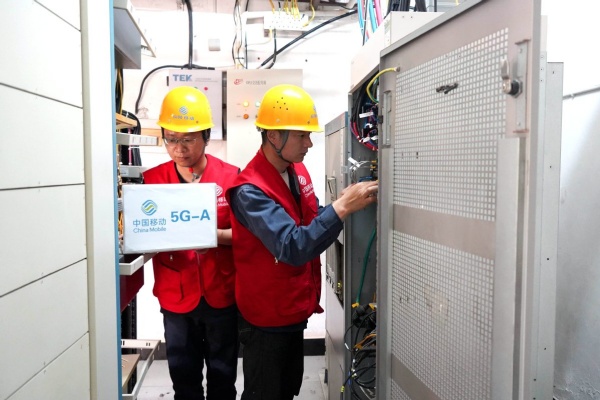
- Home
- Media Center
-
Events
- Wuzhen Summit
- Regional Forums
- Practice Cases of Jointly Building a Community with a Shared Future in Cyberspace
- World Internet Conference Awards for Pioneering Science and Technology
- The Light of Internet Expo
- Straight to Wuzhen Competition
- Global Youth Leadership Program
- WIC Distinguished Contribution Award
- Membership
- Research & Cooperation
- Digital Academy
-
Reports
- Collection of cases on Jointly Building a Community with a Shared Future in Cyberspace
- Collection of Shortlisted Achievements of World Internet Conference Awards for Pioneering Science and Technology
- Reports on Artificial Intelligence
- Reports on Cross — Border Ecommerce
- Reports on Data
- Outcomes of Think Tank Cooperation Program
- Series on Sovereignty in Cyberspace Theory and Practice
- Other Achievements
- About WIC
- 中文 | EN

5G-A pilots gathering steam

China Mobile employees check 5G-A equipment at a facility in Tongling, Anhui province. [Photo For CHINA DAILY]
Enhanced telecom tech performs better in capacity, speed, latency, and positioning
Several cities in China are exploring 5G-A network construction and application scenarios, unlocking vast opportunities for the technology's development as well as for the digital economy, experts and business executives said.
5G-A, or 5G-Advanced (also known as 5.5G by some manufacturers), represents an enhancement over 5G. It offers significant improvements in capacity, speed, latency and positioning. For example, 5G-A is 10 times faster than 5G in terms of internet speed.
Currently, Chinese telecom operators are conducting pilot deployments across several provinces. The Beijing unit of China Mobile has partnered with companies like ZTE and MediaTek to complete 5G-A network deployment in 18 densely populated areas of Beijing, with over 1,500 5G-A base stations now operational. China Unicom and China Telecom also have made such deployments, boosting the total number in the city to over 3,500.
Earlier this month, 35 cities and regions jointly announced the start of the 5G-A era, actively promoting the evolution of 5G technology and application innovation.
"2024 is widely recognized as the first year of 5G-A commercialization with operators, industry chains, equipment and standards gradually maturing. There is immense potential for development in 5G-A business models, application scenarios and industry ecosystems. The development path for 5G-A is becoming increasingly clear," said Wu Hequan, an academician at the Chinese Academy of Engineering, at a recent conference.
"5G development has reached a turning point. The application of 5G-A can meet the high bandwidth and low latency demands of extended reality and the internet of vehicles, which 5G cannot adequately support. 5G-A is crucial for enhancing and surpassing the current 5G network signal and is a necessary step toward upgrading to 6G," Wu added.
Zhao Zhiguo, chief engineer at the Ministry of Industry and Information Technology, said at a recent event hosted by the Beijing Communications Administration that further efforts are expected to strengthen China's leading advantages in 5G-A and quantum communication technologies, and advance breakthroughs in strategic technologies such as 6G, artificial intelligence and the next-generation internet.
Wen Ku, chairman of the China Communications Standards Association, said 5G-A international standards focus on continually enhancing 5G network capabilities and expanding new use cases, initiating comprehensive integration with artificial intelligence.
"Comprehensive integration with AI has become a core direction for the evolution of future communication networks," Wen said.
However, he also stressed that the smart development of mobile networks is a gradual process. The 5G-A is designed to lay a solid foundation for 6G to enable strong AI, promoting the transition from 5G "light intelligence" to achieving 6G "systematic intelligence".
Huawei's Senior Vice-President Cao Jibin predicted that in the next 5-10 years, the 5G-A network could cover needs in personal, household, office, production and travel scenarios, creating substantial economic value.
"Going forward, Beijing will actively advance the construction and deployment of 5G-A networks and actively expand application scenarios in areas such as new industrialization, urban governance, livelihood experiences and rural vitalization," said Su Shaolin, head of the Beijing Communications Administration.

The World Internet Conference (WIC) was established as an international organization on July 12, 2022, headquartered in Beijing, China. It was jointly initiated by Global System for Mobile Communication Association (GSMA), National Computer Network Emergency Response Technical Team/Coordination Center of China (CNCERT), China Internet Network Information Center (CNNIC), Alibaba Group, Tencent, and Zhijiang Lab.





